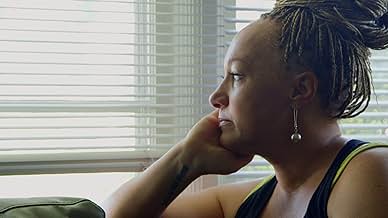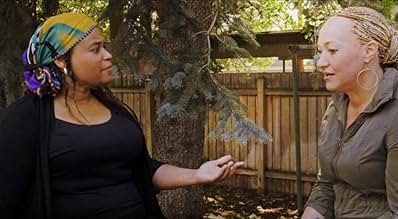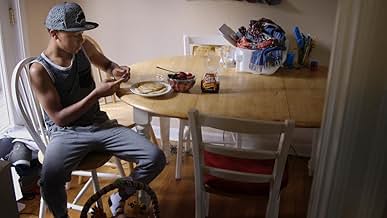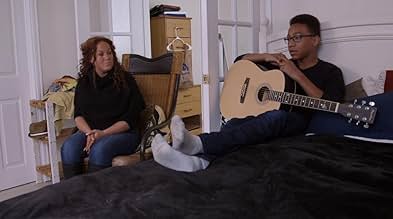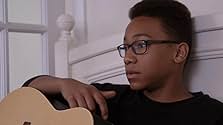IMDb RATING
6.3/10
2.9K
YOUR RATING
Rachel Dolezal becomes a social phenomenon when she passes herself off as an African American and becomes the head of her local N.A.A.C.P. chapter.Rachel Dolezal becomes a social phenomenon when she passes herself off as an African American and becomes the head of her local N.A.A.C.P. chapter.Rachel Dolezal becomes a social phenomenon when she passes herself off as an African American and becomes the head of her local N.A.A.C.P. chapter.
- Director
- Writers
- Stars
- Awards
- 1 nomination total
Vanessa Bayer
- Self
- (archive footage)
Tamar Braxton
- Self
- (archive footage)
- Director
- Writers
- All cast & crew
- Production, box office & more at IMDbPro
6.32.8K
1
2
3
4
5
6
7
8
9
10
Featured reviews
This should have been 45 minutes, not feature-length
The story of Rachel Dolezal is an interesting one - a white woman pretends to be black and runs a local branch of the NAACP, lobbying for civil rights... only to be revealed by the media to actually be a white woman. The interviews in the media with her that follow the reveal are even stranger as she basically still claims to be black, because that's how she feels inside.
This documentary has to great footage compiled of this scandal and it raises some interesting questions, such as: In this current social landscape where a person can say they were born female but feel male inside (and vice versa) and choose to reassign their gender, why can't a person do that with race? You might find yourself vacillating between wondering if Rachel Dolezal is the first of many to come in a possible future landscape of racial reassignment, or you might just think she's crazy.
Regardless of your personal views on her, the problem with this documentary is that it starts out strong and peters out because the filmmakers don't have a feature's worth of interesting footage. The inside look into Rachel's life post-scandal is pretty mundane as she talks with family and friends, drives her sons to school, paints alone inside her house, etc. Perhaps they're trying to humanize Rachel, but in the end, I eventually got bored with it.
This documentary has to great footage compiled of this scandal and it raises some interesting questions, such as: In this current social landscape where a person can say they were born female but feel male inside (and vice versa) and choose to reassign their gender, why can't a person do that with race? You might find yourself vacillating between wondering if Rachel Dolezal is the first of many to come in a possible future landscape of racial reassignment, or you might just think she's crazy.
Regardless of your personal views on her, the problem with this documentary is that it starts out strong and peters out because the filmmakers don't have a feature's worth of interesting footage. The inside look into Rachel's life post-scandal is pretty mundane as she talks with family and friends, drives her sons to school, paints alone inside her house, etc. Perhaps they're trying to humanize Rachel, but in the end, I eventually got bored with it.
Artist with poor personal judgement remakes herself as a way of dealing with her personal demons
It was interesting to see the back story of someone who would go this far to disassociate themselves from reality. But in a way you can see that she's not fallen as far from the tree as she imagines, the white savior like her parents, adopting black children, just in a different way, fueled by religious fervor of a moral crusade.
Her artistic skill is surprisingly good, its a shame she wasted it to become part of the diversity and grievance industry. But that's the thing this film reveals, she can barely fix her own life let alone anyone elses, a single mother, divorced, saddled with many children, while divorced has another child against the fathers wishes while she has no job. Is she trying to live an ugly stereotype and bring it to life?
The doc does fail to really delve deeper into what she got herself into, the vast infrastructure of the diversity industry. How this nobody became a NAACP branch president, where did they get their money, how was she teaching courses in colleges? The vast flows of money to create these human networks of diversity propagandists is something a netflix doc is never going to deal with, and that's too bad, because it destroys lives, not just Rachels, but those it indoctrinates with the poison of a history and identity of grievance. She might have been a decent artist, maybe even a history teacher, if she had not tried to be what she was not and had spent her time on herself rather than trying to be the white savior.
When she joined the game of identity politics she learned the lesson that the content of her character meant nothing. That is the lesson of her life, and this film.
Interesting and sad.
I went between laughing at her and feeling sorry for her. She's clearly got some emotional issues that need to be addressed at a professional level.
At the end of the day, especially in this day and age when people don't even know what gender they are and what bathroom they should use, who cares that she wants to be close to the black culture? Her problem isn't her mental issues, it's that she lied about it for so long and so publicly, nobody will sympathize now.
If she had just been truthful from the beginning, this documentary would have never been made.
I do find it very odd though that EVERYTHING she does is black. Black adoptions, black friends, etc. Must be what the Kardashians girls have? Not sure.
At the end of the day, especially in this day and age when people don't even know what gender they are and what bathroom they should use, who cares that she wants to be close to the black culture? Her problem isn't her mental issues, it's that she lied about it for so long and so publicly, nobody will sympathize now.
If she had just been truthful from the beginning, this documentary would have never been made.
I do find it very odd though that EVERYTHING she does is black. Black adoptions, black friends, etc. Must be what the Kardashians girls have? Not sure.
A below average Netflix documentary
While Rachel's story is interesting and raises many valid questions about race and identity, the viewer doesn't actually learn much about these topics. As a staple of Netflix documentaries, The Rachel Divide includes virtually no expert opinions or historical background or even contextual information - I would've loved to hear what actual scholars and researchers of race or identity think about this issue! - all we get is Rachel sharing her feelings and long scenes of her doing chores or talking to her family. And then of course a bunch of clips of people angrily reacting to the whole issue.
I think it's a massive missed opportunity and although the ending desperately wants to ask the viewer "well what do you think?" there is almost nothing to base our opinions on.
I think it's a massive missed opportunity and although the ending desperately wants to ask the viewer "well what do you think?" there is almost nothing to base our opinions on.
The Reverse Michael Jackson
This is an interesting story, and raises genuine issues but fails to delve into them deeply. The good part of the doco though is how it shows how Rachel's decisions and actions impacted on her kids and family. I do believe she needs help regarding a possible identity disorder and that her 13 year old son desperately requires some form of counselling. I have complete and utter empathy for her up bringing and the actual good work she did for the African American community, however, fluidity when it comes to ethnicity does not exist yet and probably won't anytime soon. I feel it would have been far better if she had just identified as neither race and explained that she feels a stronger connection to the black community (due to her kids) and that she doesn't want the same possible prejudices against her family. I think most people would have agreed with her feelings regarding this, could relate and be driven for change together.
Did you know
- Quotes
Franklin: All my mom did is say she was black and people just lost their minds
- How long is The Rachel Divide?Powered by Alexa
Details
- Release date
- Country of origin
- Language
- Also known as
- 黑白瑞秋
- See more company credits at IMDbPro
- Runtime
- 1h 40m(100 min)
- Color
- Aspect ratio
- 1.85 : 1
Contribute to this page
Suggest an edit or add missing content


